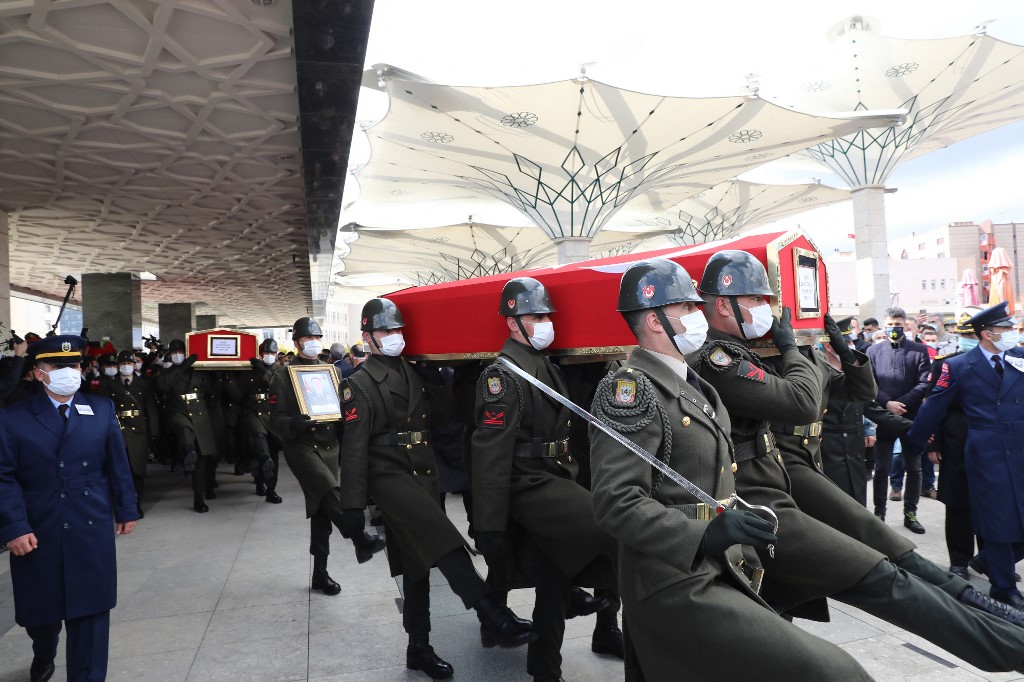The Turkish military’s strategy in northern Iraq is under scrutiny following a series of deadly clashes with the Kurdistan Workers’ Party (PKK) that have led to significant casualties among Turkish forces.
The recent increase in casualties has raised serious questions about the effectiveness and sustainability of the Turkish Armed Forces’ (TSK) ongoing Operation Claw-Lock.
The operation, which began in April 2022, is targeting PKK hideouts in the Metina region of northern Iraq. The recent surge of Turkish military losses — 21 soldiers killed in just under a month — shows a worrying upward trend in the conflict between the outlawed Kurdish fighters and Turkey.
On December 22 and 23, 2023, and again on January 12, 2024, PKK militants carried out a series of attacks, killing 12 and nine soldiers, respectively. These events not only exacerbated the military conflict, as Turkey bombed Syria and Iraq in retaliation, but also fueled the political debate in Turkey, especially in light of the upcoming local elections.
In response to these attacks, Turkish President Recep Tayyip Erdoğan convened a high-level security meeting in İstanbul on Saturday. While the meeting reaffirmed Turkey’s commitment to the fight against terrorism, it did little to allay public concerns about the rising death toll of the conflict.
Critics, including retired military officers and opposition leaders, claim that Turkey’s military operations suffer from strategic and tactical shortcomings.
One of the main criticisms is possible intelligence failures.
Critics also question whether the troops were adequately prepared for the harsh winter in mountainous northern Iraq.
Opposition parties, particularly the Republican People’s Party (CHP), are demanding answers on the military’s tactical planning and the status of logistical support, such as thermal imaging systems and the capacity for timely medical interventions in the inhospitable terrain.
The Turkish government has long justified its operations in northern Iraq as necessary to combat the threat posed by the PKK.
The PKK, which is classified as a terrorist organization by Turkey and much of the international community, has been in an armed conflict with the Turkish armed forces for over four decades.
Military analysts suspect that the PKK’s ability to carry out successful attacks during the winter, a time when the group is traditionally less active, is an indication of a possible change in its tactical approach.
There are also allegations of external support for the PKK, with various international actors accused of indirectly backing the group.
Ankara has long been unhappy with the supply of weapons and equipment by the US to the Syrian Democratic Forces (SDF), which consists mainly of the People’s Defense Units (YPG) and is seen by Turkey as an extension of the PKK.
In an interview with the Turkish edition of Deutsche Welle (DW Türkçe), Iraq expert Dr. Bilgay Duman points to the possibility that the outlawed fighters are adapting to recent technological advances in the military field and occasionally benefiting from the resources of other states. There is speculation as to whether weapons and equipment from the US have been used in recent attacks, with other countries in the volatile region, including Israel and Russia, also being looked at. Russia does not recognize the PKK as a terrorist group.
Duman also points to a tactical shift in the PKK, suggesting that the organization, following the example of the YPG in Syria, has sought to build more permanent structures in Iraq. This shift has resulted in the PKK carrying out attacks in harsh winter conditions, which is a departure from its usual tactics and suggests that the TSK needs to rethink its strategy. Duman explains that the PKK’s presence in the region is not new but that it has been operating there for over 40 years.
Another criticism is the positioning of Turkish military posts, which are often described as temporary bases and lack the technical infrastructure typical of permanent bases. These locations are criticized for not providing sufficient security measures for the soldiers, especially considering the difficult climate and geographical location.
Retired Brig. Gen. Haldun Solmaztürk sharply criticized the government and military leadership’s handling of the situation in a column for the Gazete Pencere news website after the latest attack on Friday. He accuses the political and military leadership of not properly understanding the strategic and tactical requirements of such operations.
Solmaztürk points out past instances, such as the civil war in Syria, which has been ongoing for 13 years now, where he believes similar failures in decision-making and strategy were evident. He emphasizes that traditional institutions, rules and conventions related to Turkey’s national security policy have been completely disregarded by the government of President Erdoğan, leading to the current predicament.
Solmaztürk further criticizes the lack of alternative strategies being considered by the defense ministry and the presidency. He notes that the Turkish parliament has given the president broad discretion over military operations, but there appears to be no substantial review or modification of these strategies despite the rising casualties and challenges. This approach, according to Solmaztürk, indicates a lack of adaptive and responsive policymaking in the face of evolving threats and conditions.
The Turkish parliament has scheduled discussions on the recent attacks. Defense Minister Yaşar Güler and Foreign Minister Hakan Fidan are expected to brief MPs. It is expected that criticism of the operations will be further addressed in the parliamentary debates.
The CHP, led by Özgür Özel, has been particularly critical of the government’s handling of the operation. Özel emphasizes that the political parties must deliver more than just condemnatory messages and urges the government to take concrete measures and exchange information.
Leading representatives of the Nationalist Movement Party (MHP), which is allied with Erdoğan, and the nationalist opposition party İYİ (Good) have supported the government’s stance following talks with the president.
As Operation Claw-Lock continues, the Turkish military and government are under increasing pressure to respond to this criticism.
With local elections approaching, the issue of national security and the effectiveness of the government’s counterterrorism strategy are likely to remain at the center of political discourse.


